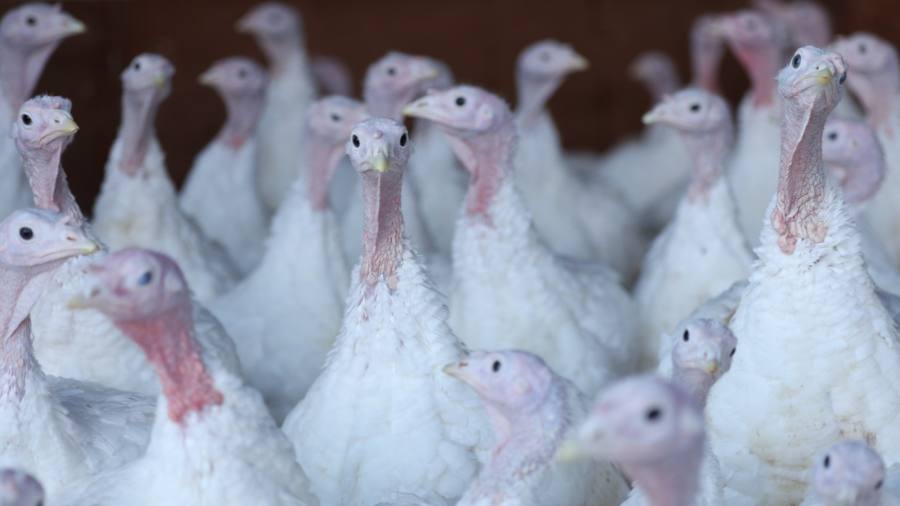
The UK has lost 40 per cent of its free-range turkey flock to bird flu and the resulting culls, leaving some high-end butchers without supplies and adding to pressures on the market over the key Christmas period.
Poultry farmers are battling the country’s worst-ever avian influenza outbreak, which has proved lethal to birds traditionally eaten in the festive season, especially free-range flocks. English poultry owners have been required to keep flocks indoors since Monday to combat further spread.
“This strain is particularly virulent around turkeys, ducks and geese rather than chickens,” said Richard Griffiths, chief executive of the British Poultry Council, a trade group. “It’s striking the Christmas birds and it is growing exponentially.”
The current outbreak — which began in October 2021 but has proved more severe this year so far than last winter — has already claimed two-fifths of the 1.2mn to 1.4mn free-range turkeys raised annually, said Griffiths.
Gressingham, one of the largest producers, said its entire goose flock across three farms had been wiped out.
“Our duck and turkey farms have also been affected, which is resulting in reduced supply to all our customers,” said Gressingham, the UK’s largest duck producer.
Steve Childerhouse of Great Grove Poultry in Norfolk said bird flu last month destroyed his entire flock. About 5,000 birds died in the two days between his discovery of the infection and the arrival of culling teams. The remaining 8,500 turkeys and geese were destroyed.
“Five or six weeks ago everything was looking so good, the birds were looking good, and then . . . avian flu came and blew it all to smithereens,” he said, adding that the infection meant he would probably seek work in a culling team as his farm could not be used for 12 months.
Some of the 90 butchers and farm shops he normally supplies will simply not offer Christmas birds this year, Childerhouse said.
Some 2.3mn birds — including chickens, ducks, geese and turkeys — have been culled in the current bird flu season, according to official data, against 3.2mn in the whole 2021-22 season.
While that is only a small proportion of the 20mn birds produced weekly in the UK, it has been weighted towards Christmas poultry.
Griffiths said several medium-sized turkey farmers had decided to exit the industry permanently. Paul Kelly, an Essex-based turkey farmer who is a major supplier of young birds to other farms, said customers were declining to commit for next year, leaving him unsure how many eggs he should cultivate. “They’re saying: ‘We can’t take the risk,’” he said.
Ministers are allowing turkey producers to freeze then thaw birds, selling them as fresh — a measure enabling them to slaughter birds sooner in an effort to outrun the virus. The UK produces about 11mn turkeys a year, two-thirds of which are for the Christmas period.
The government compensates farmers forced to cull birds, although the industry wants payments to be calculated from the start of an outbreak and to include cash for sick birds as well as healthy ones that are culled.
James Mottershead, chair of the National Farmers’ Union poultry board, said better compensation would help insurers re-enter the market, giving farmers the confidence to plan for 2023 and avoid shortages.
The Department for Environment, Food and Rural Affairs said: “Working closely with the farming and poultry sectors, we’ve announced a package of support including quicker compensation payments, relaxing marketing rules for poultry produce to help with business planning, as well as stepping up biosecurity measures.”